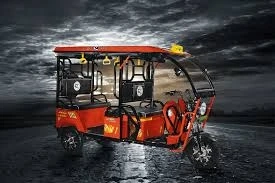India’s transportation sector is undergoing a green revolution, with electric vehicles becoming an essential part of the journey toward sustainability. Among the different categories, electric rickshaws have become the backbone of urban and semi-urban mobility. Affordable, eco-friendly, and driver-friendly, they have captured a significant portion of the last-mile transportation market.
With demand rising sharply, many entrepreneurs are exploring opportunities in the electric rickshaw dealership business. From financial growth to social impact, this sector offers immense potential. But what does it mean to start a dealership, and how can it benefit business owners? Let’s explore.

Why Electric Rickshaw Dealerships Are in Demand
The growing popularity of Electric Rickshaw Dealership has created a massive need for dealership networks across India. Some key reasons behind this surge include:
- High Market Demand: Rising fuel costs and increased awareness of clean mobility make e-rickshaws a top choice for commuters and drivers.
- Government Incentives: Subsidies, tax benefits, and relaxed policies encourage more adoption of EVs.
- Employment Generation: Dealers play a role in empowering thousands of drivers with self-employment opportunities.
- Eco-Friendly Solution: Zero tailpipe emissions contribute to reducing air pollution in congested cities.
- Affordable Mobility: Low purchase cost and minimal running expenses attract drivers and passengers alike.
What is an Electric Rickshaw Dealership?
An E Rickshaw Dealership is a business model where authorized dealers sell e-rickshaws directly to customers, often supported by manufacturers. Dealers act as a bridge between producers and buyers by offering:
- Sales and delivery of e-rickshaws.
- Financing options for buyers.
- After-sales support and servicing.
- Spare parts availability.
- Information on government subsidies and registration processes.
This makes dealerships an essential part of the EV ecosystem.
Benefits of Starting an Electric Rickshaw Dealership
- High Demand, High Profit
- With demand rising rapidly, dealerships have the potential for consistent sales and strong profit margins.
- Low Operating Costs
- Compared to other automobile businesses, starting an e-rickshaw dealership requires relatively low investment and overhead costs.
- Government Support
- Dealers benefit indirectly from EV-friendly policies, including subsidies and tax exemptions for buyers.
- Sustainable Business
- Being part of the green mobility revolution enhances reputation and aligns with global sustainability goals.
- Wide Customer Base
- E-rickshaws are used in cities, towns, and villages, creating opportunities across urban and rural markets.
Key Factors to Consider Before Starting a Dealership
If you’re planning to open an Electric Rickshaw Manufacturers, here are important aspects to keep in mind:
- Location Advantage: Choose areas with high demand for local transport or last-mile connectivity.
- Manufacturer Tie-Up: Partner with a trusted manufacturer that provides quality vehicles and strong after-sales support.
- Investment Planning: Initial costs may include dealership fees, showroom setup, inventory, and service center facilities.
- After-Sales Service: Ensure availability of servicing and spare parts to build trust with customers.
- Marketing & Promotion: Reach out to potential buyers through local advertising, roadshows, and digital marketing.
Opportunities in the Electric Rickshaw Dealership Business
The dealership business is more than just selling vehicles. Opportunities include:
- Retail Sales: Selling directly to drivers and small business owners.
- Fleet Partnerships: Supplying e-rickshaws to ride-sharing and logistics companies.
- Service Center Operations: Generating additional revenue through maintenance and spare parts.
- Financing Assistance: Partnering with banks or NBFCs to help customers with loans.
As the sector matures, dealerships that provide end-to-end solutions will enjoy long-term customer loyalty.
Challenges Faced by Dealers
Like any business, dealerships also come with challenges:
- Competition: Growing number of dealerships in popular cities.
- Awareness Gaps: Some buyers still hesitate due to limited knowledge about EVs.
- Battery Costs: High upfront cost of lithium-ion batteries can affect purchase decisions.
- Charging Infrastructure: Limited public charging stations in rural areas may impact sales.
By offering quality service and customer education, dealers can overcome these hurdles effectively.
The Future of Electric Rickshaw Dealerships in India
The future looks bright. With India aiming to electrify a significant portion of its transport sector by 2030, the role of dealerships will expand further. Dealers can expect:
- Higher Sales Volumes with falling battery costs.
- Increased Rural Penetration as awareness grows outside cities.
- Digital Integration where customers compare and book vehicles online.
- Battery Swapping Tie-Ups to provide faster turnaround solutions.
In short, an electric rickshaw dealership is not only a profitable venture today but also a future-ready business opportunity.
Conclusion
Opening an E Rickshaw Manufacturers in India is more than just a business opportunity—it’s a chance to contribute to sustainable mobility while generating strong profits. With rising demand, supportive policies, and expanding markets, dealerships are set to play a central role in the EV revolution.
FAQs on Electric Rickshaw Dealership
Q1. What is required to start an electric rickshaw dealership?
You need investment capital, a tie-up with a reliable manufacturer, showroom space, and facilities for after-sales service.
Q2. How much investment is needed to open a dealership?
The investment depends on the scale, but generally ranges from ₹5 lakh to ₹15 lakh, including setup, inventory, and service center.
Q3. Is the electric rickshaw dealership business profitable?
Yes, due to rising demand, low operating costs, and government support, dealerships can earn healthy margins.
Q4. What support do manufacturers provide to dealers?
Manufacturers usually provide vehicle supply, training, marketing materials, and sometimes financial support for showroom setup.
Q5. How can dealerships attract more customers?
By offering financing options, quality after-sales services, spare part availability, and promoting government subsidy benefits.
Q6. Can dealerships operate in rural areas?
Yes, in fact, rural markets offer huge potential due to affordability and growing demand for local transport.
Q7. What role do government incentives play in dealership success?
Subsidies reduce the purchase price for customers, directly boosting sales and dealership revenue.



